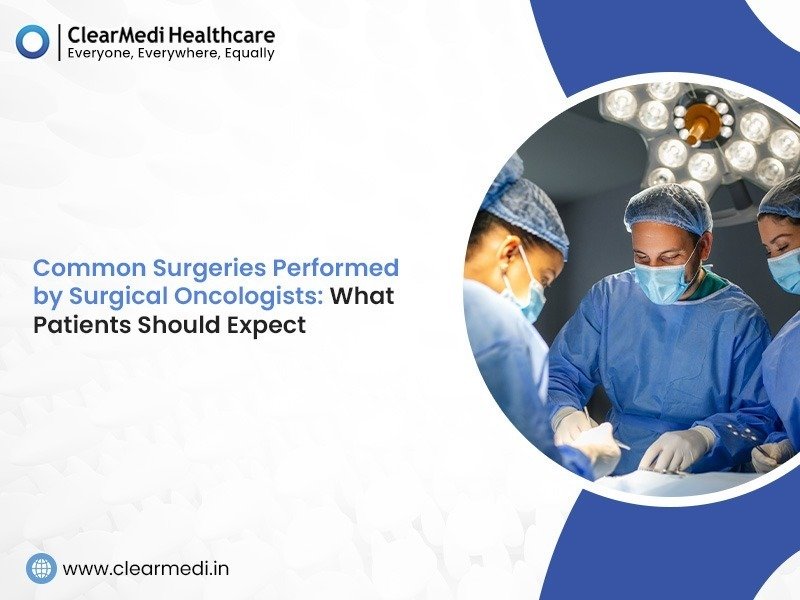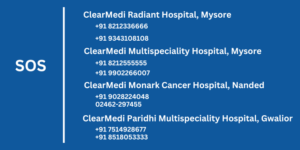Surgical oncology combines precision, strategy, and innovation to treat cancer through surgical procedures. While some surgeries focus on removing tumours directly, others aim to manage symptoms or prevent cancer from spreading. The approach depends on several factors, including tumour type, size, and location. With advancements in imaging and robotic-assisted surgery, these procedures have become more precise, leading to improved recovery. This article breaks down common cancer-related surgeries and what individuals can expect from the process.
Common Surgical Oncology Procedures
1. Biopsy: The First Step in Diagnosis
The first step of the process undertaken by the surgical oncologists in Mysore is biopsy when cancer is first suspected. The procedure is such that a small sample of tissue is removed, and microscopic examination is performed. It is done to confirm the presence of cancerous cells. Different types include:
- Needle biopsy – A fine or core needle guided by imaging techniques is used to extract tissue.
- Incisional biopsy – A small section of the abnormal tissue is surgically removed for testing.
- Excisional biopsy – The entire suspicious lump or lesion is removed, particularly if it is small and accessible.
2. Lumpectomy and Mastectomy: Breast Cancer Surgeries
For breast cancer, the surgical approach depends on tumour size, location, and stage:
- Lumpectomy – Removes the tumour and a small margin of surrounding healthy tissue, allowing breast conservation.
- Mastectomy – Involves removing one or both breasts and can be performed as total, skin-sparing, or nipple-sparing, depending on the individual’s condition and treatment goals.
3. Colectomy: Surgery for Colorectal Cancer
A colectomy at clearmedi healthcare involves removing a part (partial colectomy) or all (total colectomy) of the colon, which may be required for colorectal cancer. With the advancement in techniques and technology, the experts are inclining towards non-conventional procedures like laparoscopic and robotic-assisted surgery, as they offer smaller incisions and faster recovery.
4. Gastrectomy: Treating Stomach Cancer
A gastrectomy is performed when stomach cancer is diagnosed and can be:
- Partial gastrectomy – Removes the affected portion of the stomach, preserving part of its function.
- Total gastrectomy – Involves removing the entire stomach, with reconstruction to enable continued digestion.
5. Prostatectomy: Surgery for Prostate Cancer
A prostatectomy is performed to remove the prostate gland when cancer is present. Advances in robotic-assisted surgery have improved precision and minimised recovery times.
6. Hysterectomy: Managing Gynaecological Cancers
This procedure removes the uterus and, in some cases, the cervix, ovaries, and fallopian tubes. Depending on the stage and type of cancer, it may be performed via open surgery, laparoscopy, or robotic techniques.
7. Lung Resection
As the name indicates, it is concerned with lung cancer. However, the exact surgery to be followed by surgical oncologists in Mysore depends on the stage of cancer, as the spread is dependent.
- Lobectomy – Removes a single lobe of the lung, recommended for early-stage lung cancer.
- Pneumonectomy – Here, the entire lung is removed as cancerous cells are no longer confined to a single or particular lobe.
8. The Whipple Procedure
A Whipple procedure (pancreaticoduodenectomy) is a highly specialised operation for pancreatic, bile duct, and some intestinal cancers. It involves removing the head of the pancreas, part of the small intestine, gallbladder, and bile duct, followed by intricate reconstruction of the digestive tract.
What to Expect Before, During, and After Surgery
A person undergoing surgery already has a lot of concerns, doubts, and uncertainties in their mind. Having a prior awareness of the procedure would be beneficial in easing the process.
Before Surgery: Preparation and Planning
- Consultation – A thorough discussion with the surgical oncologist covering risks, benefits, and postoperative expectations.
- Preoperative Tests – Blood work, imaging scans, and other diagnostic evaluations help guide surgical planning.
- Lifestyle Adjustments – Recommendations may include dietary changes, smoking cessation, and specific exercise routines to support recovery.
During Surgery: What Happens in the Operating Theatre
- Anaesthesia – General anaesthesia is typically used to provide comfort and a pain-free procedure.
- Surgical Approach – The technique may be open surgery (traditional incision), minimally invasive (laparoscopic), or robotic-assisted, depending on the specific cancer and location.
After Surgery: Recovery and Follow-Up Care
- Hospital Recovery – Post-surgical monitoring includes pain management, wound care, and early mobilisation to reduce complications.
- Rehabilitation – Some individuals may need physical therapy or adjustments in the diet for a smoother recovery.
- Ongoing Surveillance – Regular follow-ups help monitor healing and detect any recurrence, with additional treatments such as chemotherapy or radiotherapy introduced if required.
Advancements in Surgical Oncology
Surgical techniques continue to evolve, with improvements in precision and recovery times. Innovations such as targeted therapies, robotic surgery, and enhanced imaging techniques contribute to better outcomes. Minimally invasive procedures allow for quicker recovery, reduced hospital stays, and lower risk of complications.
The integration of surgical oncology with other treatment modalities, such as immunotherapy and radiation, has led to more personalised and effective treatment strategies. For example, some cancers that were previously considered inoperable can now be treated through multidisciplinary approaches that combine surgery with other therapies.
Emotional and Physical Wellbeing
Undergoing cancer surgery can be a challenging experience, both physically and emotionally. Support from clearmedi healthcare teams, family, and counselling services can be beneficial. Recovery is not only about physical healing but also about regaining confidence and adapting to changes post-surgery.
Understanding the available surgical options, advancements in care, and post-surgical support systems can help individuals approach their treatment with clarity and reassurance. Each surgical plan is tailored to the individual’s diagnosis and overall health, providing the best possible chance of recovery and long-term well-being.
Conclusion
Surgical intervention remains a vital part of cancer treatment, offering effective solutions for tumour removal, disease management, and symptom relief. With advancements in surgical techniques, individuals now have access to more precise and less invasive procedures that support faster recovery and improved outcomes. Whether undergoing a minor biopsy or a complex organ resection, expert guidance and post-surgical care play a crucial role in the treatment journey.
For specialised surgical oncology care, Dr Naveen S, Consultant – Surgical Oncologist, Laparoscopic and Robotic Surgeon, provides expert treatment at ClearMedi Radiant Hospital, Mysore. With a focus on precision, innovation, and patient-centred care, Dr. Naveen S offers advanced surgical solutions tailored to each diagnosis.
To discuss treatment options or seek a consultation, visit ClearMedi Radiant Hospital, Mysore and receive expert care from a dedicated oncology specialist.
Also Read About:
How to Prevent Gastric Ulcers: A Comprehensive Guide
Breast Cancer in Older Adults: Unique Considerations in Diagnosis and Treatment


